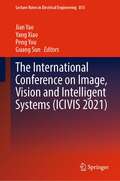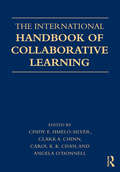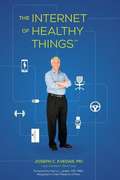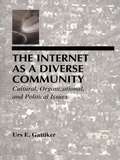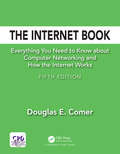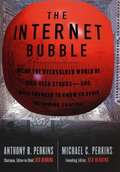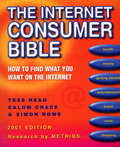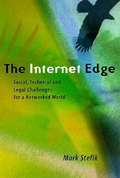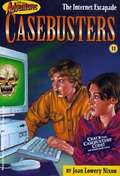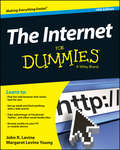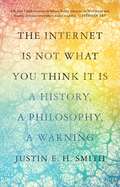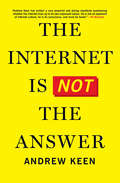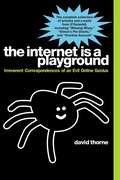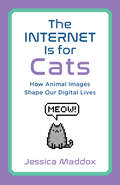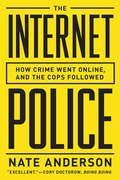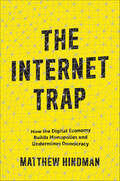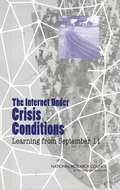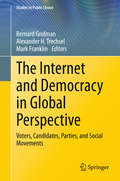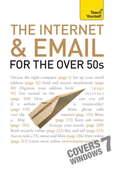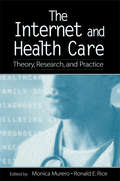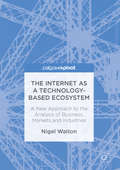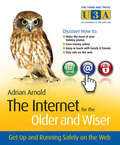- Table View
- List View
The International Conference on Image, Vision and Intelligent Systems (Lecture Notes in Electrical Engineering #813)
by Yang Xiao Jian Yao Peng You Guang SunThis book is a collection of the papers accepted by the ICIVIS 2021—The International Conference on Image, Vision and Intelligent Systems held on June 15–17, 2021, in Changsha, China. The topics focus but are not limited to image, vision and intelligent systems. Each part can be used as an excellent reference by industry practitioners, university faculties, research fellows and undergraduates as well as graduate students who need to build a knowledge base of the most current advances and state-of-practice in the topics covered by this conference proceedings.
The International Handbook of Collaborative Learning (Educational Psychology Handbook)
by Cindy E. Hmelo-Silver Clark A. Chinn Carol K. K. Chan Angela M. O’DonnellCollaborative learning has become an increasingly important part of education, but the research supporting it is distributed across a wide variety of fields including social, cognitive, developmental, and educational psychology, instructional design, the learning sciences, educational technology, socio-cultural studies, and computer-supported collaborative learning. The goal of this book is to integrate theory and research across these diverse fields of study and, thereby, to forward our understanding of collaborative learning and its instructional applications. The book is structured into the following 4 sections: 1) Theoretical Foundations 2) Research Methodologies 3) Instructional Approaches and Issues and 4) Technology. Key features include the following: Comprehensive and Global – This is the first book to provide a comprehensive review of the widely scattered research on collaborative learning including the contributions of many international authors. Cross disciplinary – The field of collaborative learning is highly interdisciplinary drawing scholars from psychology, computer science, mathematics education, science education, and educational technology. Within psychology, the book brings together perspectives from cognitive, social, and developmental psychology as well as from the cross-disciplinary field of the learning sciences. Chapter Structure – To ensure consistency across the book, authors have organized their chapters around integrative themes and issues. Each chapter author summarizes the accumulated literature related to their chapter topic and identifies the strengths and weaknesses of the supporting evidence. Strong Methodology – Each chapter within the extensive methodology section describes a specific methodology, its underlying assumptions, and provide examples of its application. This book is appropriate for researchers and graduate level instructors in educational psychology, learning sciences, cognitive psychology, social psychology, computer science, educational technology, teacher education and the academic libraries serving them. It is also appropriate as a graduate level textbook in collaborative learning, computer-supported collaborative learning, cognition and instruction, educational technology, and learning sciences.
The Internet
by Meg GreveThis book details just what the Internet is, how it works, and how to be responsible when using it.
The Internet of Healthy Things
by Carol Colman Joseph C. Kvedar Gina CellaBy 2020, experts predict that more than 20 billion everyday objects will be able to capture, receive and share data via a vast, interconnected global network linked together by inexpensive sensors, GPS and 'the cloud. ' Just around the corner, real time biometric data will be automatically captured and used to learn more about the impact of lifestyle on chronic diseases and wellness, and ultimately change behavior to improve our health. A technological and social shift of this magnitude will be felt by virtually every sector of the economy, every business and every human being. It's a story that needs to be told by someone who has more than an academic understanding of this megatrend -- it needs to be told by someone who helped to create it. In his new book, The Internet of Healthy Things, (IoHT) connected health pioneer and visionary Dr. Joe Kvedar describes the phenomena driving this trend and the business opportunities that arise from it. Connecting to the IoHT presents a huge opportunity for all sectors of business and society, including payers, providers, pharma and biotech companies, and technology vendors , as well as newcomers to the space with fresh, creative ideas. This book shares Dr. Kvedar's observations as a 20-year veteran in the field.
The Internet (Kaleidoscope)
by Darcy LockmanProvides an explanation of the various parts and functions of the Internet.
The Internet As A Diverse Community: Cultural, Organizational, and Political Issues (LEA Telecommunications Series)
by Urs E. GattikerIn this volume, author Urs Gattiker offers a broad overview of Internet and technology-related theory. He examines Internet and multimedia issues from an international perspective, outlining issues of international sovereignty and the potential impact of national interests on global technology policy. He also surveys the issues of regulation and institutionalization of the Internet, examines ways for reducing the inequality of benefits from such technology, and explores the opportunities and challenges the Internet offers for consumers, firms, governments, and interest groups. In assembling this treatise, Gattiker synthesizes a vast body of literature from communication, economics, philosophy, political science, management, psychology, science policy, telecommunication engineering, and other areas. The Internet as a Diverse Community provides readers with a framework for analyzing and selecting between many different Internet choices. It explores issues from a social-impact perspective, using examples from a variety of contexts and firms around the world. The work also offers a wealth of new social theory on such topics as moral and ethical issues and the opportunities, choices, and challenges the Internet offers for consumers, investors, managers, and public policy decision makers. It examines the current and future challenges that computer-mediated technologies present, and sets forth new theoretical perspectives on such areas as multimedia and the profit-maximizing firm; the Internet and the private user; managing multimedia productively; and the social and moral costs of various Internet options and choices. Taken as a whole, this resource provides valuable insights on the Internet and is essential reading for business, telecommunication, public policy, and technology decision makers around the globe.
The Internet Book: Everything You Need to Know about Computer Networking and How the Internet Works
by Douglas E. ComerThe Internet Book, Fifth Edition explains how computers communicate, what the Internet is, how the Internet works, and what services the Internet offers. It is designed for readers who do not have a strong technical background — early chapters clearly explain the terminology and concepts needed to understand all the services. It helps the reader to understand the technology behind the Internet, appreciate how the Internet can be used, and discover why people find it so exciting. In addition, it explains the origins of the Internet and shows the reader how rapidly it has grown. It also provides information on how to avoid scams and exaggerated marketing claims. <P><P>The first section of the book introduces communication system concepts and terminology. The second section reviews the history of the Internet and its incredible growth. It documents the rate at which the digital revolution occurred, and provides background that will help readers appreciate the significance of the underlying design. The third section describes basic Internet technology and capabilities. It examines how Internet hardware is organized and how software provides communication. This section provides the foundation for later chapters, and will help readers ask good questions and make better decisions when salespeople offer Internet products and services. The final section describes application services currently available on the Internet. For each service, the book explains both what the service offers and how the service works. <P><P>About the Author <P><P>Dr. Douglas Comer is a Distinguished Professor at Purdue University in the departments of Computer Science and Electrical and Computer Engineering. He has created and enjoys teaching undergraduate and graduate courses on computer networks and Internets, operating systems, computer architecture, and computer software. One of the researchers who contributed to the Internet as it was being formed in the late 1970s and 1980s, he has served as a member of the Internet Architecture Board, the group responsible for guiding the Internet’s development. Prof. Comer is an internationally recognized expert on computer networking, the TCP/IP protocols, and the Internet, who presents lectures to a wide range of audiences. In addition to research articles, he has written a series of textbooks that describe the technical details of the Internet. Prof. Comer’s books have been translated into many languages, and are used in industry as well as computer science, engineering, and business departments around the world. Prof. Comer joined the Internet project in the late 1970s, and has had a high-speed Internet connection to his home since 1981. He wrote this book as a response to everyone who has asked him for an explanation of the Internet that is both technically correct and easily understood by anyone. An Internet enthusiast, Comer displays INTRNET on the license plate of his car.
The Internet Bubble: Inside the Over-valued world of High Tech Stocks and What You Need to Know to Avoid the Coming Shakeout
by Anthony B. Perkins Michael C. PerkinsThis book exposes the incredible rise of the Silicon Valley wealth machine, before the bubble burst.
The Internet Consumer Bible
by Calum Chace Tess Read Simon RoweThe Internet Consumer Bible is the most authoritative guide to the internet available. Far more than a directory, this book shows you - whether novice or experienced web surfer - which sites can help you and which sites are a waste of time. Taking you through every aspect of life and showing how to save hundreds of pounds and release hours of valuable time for other activities, the book also looks at what you can't do on the web or what you can still do better offline. Chapters finish with a list of sites in the area providing a brief description of what the site does and a star rating of 1-5 for how good each is. There are five major sections: 1) Basics. Chapters in this section include: what is a 'good website'?; getting started, unmetered access, ADSL, virus programmes, firewalls, screening software, mobile internet and interactive TV.2) Lifestages. Chapters in this section include: births and young children; education; dating, marriage and divorce; work: job-seeking, self-employment, redundancy; death.3) Shopping. Chapters in this section include: home, mortgages, online estate agencies, DIY, gardening, cars, clothes, groceries.4) Entertainment and Leisure. Chapters in this section include: travel and holidays, sport, films, music, restaurants, TV, nightlife, genealogy, weather, hobbies.5) Organising Your Life. Chapters in this section include: money (covers investing
The Internet Edge: Social, Technical, and Legal Challenges for a Networked World
by Mark J. StefikThis book offers an eagle's eye view of the Internet edge. It is about the experiences of those who encountered similar issues as they built precursors to the Net such as videotext, teletext, and the Source.
The Internet Escapade
by Joan Lowery NixonBecause Sean and Matt have been playing pranks on the school computers, they are in trouble when someone else creates real mischief with the technology.
The Internet For Dummies
by John R. Levine Margaret Levine YoungThe latest update to a perennial bestseller gets you up and running on the Internet!Now in its lucky thirteenth edition, this peerless book has outsold and outlasted all the competition. Veteran authors John Levine and Margaret Young return with an updated road map to both the online tools and resources that have defined the Internet for years, as well as all the new things that keep Internet users interested. You'll not only find a lot of the basics presented in a straightforward and friendly style, you'll also get the latest on social networking, security, and much more.The authors begin with an overview of all things Internet-related and branch into vital topics such as keeping personal information secure and protecting your kids online. You'll gain valuable insight to web browsers, search options, online shopping, and personal finance tools. Before you know it, you'll know how to use Internet tools to find, stream, download, or share music, video, and photos. Helpful advice on staying in touch walks you through setting up and using online e-mail, chat, and social networking sites.Introduces you to what's online, how to deal with annoyances like spam and spyware, and how to control what your kids see and do onlineWalks you through picking a provider, getting hooked up to the Internet, and sharing a connection in your home or with other devicesGives you a guided a tour through popular web browsers, getting good search results; finding music and video; shopping; banking; and sharing filesAlso covers e-mail, connecting with friends, online chats, and moreHelps you find the hot social networking sites and see how to handle photo and video sharingGet going and get online with this easy-to-understand, helpful guide!
The Internet Is Not What You Think It Is: A History, a Philosophy, a Warning
by Justin E. SmithAn original deep history of the internet that tells the story of the centuries-old utopian dreams behind it—and explains why they have died todayMany think of the internet as an unprecedented and overwhelmingly positive achievement of modern human technology. But is it? In The Internet Is Not What You Think It Is, Justin Smith offers an original deep history of the internet, from the ancient to the modern world—uncovering its surprising origins in nature and centuries-old dreams of radically improving human life by outsourcing thinking to machines and communicating across vast distances. Yet, despite the internet’s continuing potential, Smith argues, the utopian hopes behind it have finally died today, killed by the harsh realities of social media, the global information economy, and the attention-destroying nature of networked technology.Ranging over centuries of the history and philosophy of science and technology, Smith shows how the “internet” has been with us much longer than we usually think. He draws fascinating connections between internet user experience, artificial intelligence, the invention of the printing press, communication between trees, and the origins of computing in the machine-driven looms of the silk industry. At the same time, he reveals how the internet’s organic structure and development root it in the natural world in unexpected ways that challenge efforts to draw an easy line between technology and nature.Combining the sweep of intellectual history with the incisiveness of philosophy, The Internet Is Not What You Think It Is cuts through our daily digital lives to give a clear-sighted picture of what the internet is, where it came from, and where it might be taking us in the coming decades.
The Internet Is Not the Answer
by Andrew KeenSince its creation during the Cold War, the Internet, together with the Web, personal computers, tablets and smartphones, has ushered in one of the greatest shifts in society since the Industrial Revolution. The Digital Revolution has contributed to the world in many positive ways, but we are less aware of the Internet’s deeply negative effects.The Internet Is Not the Answer, by longtime Internet skeptic Andrew Keen, offers a comprehensive look at what the Internet is doing to our lives. The book traces the technological and economic history of the Internet, from its founding in the 1960s through the rise of big data companies to the increasing attempts to monetize almost every human activity. In this sharp, witty narrative, informed by the work of other writers, reporters, and academics, as well as his own research and interviews, Keen shows us the tech world, warts and all.Startling and important, The Internet Is Not the Answer is a big-picture look at what the Internet is doing to our society and an investigation of what we can do to try to make sure the decisions we are making about the reconfiguring of our world do not lead to unpleasant, unforeseen aftershocks.
The Internet Is a Playground: Irreverent Correspondences of an Evil Online Genius
by David ThorneFeaturing all of Thorne's viral success, including "Missing Missy", The Internet Is a Playground culls together every article and e-mail from Thorne's wildly popular website 27bslash6.com, as well as enough new material, available only in these pages, to keep you laughing--and, indeed, crying--until Thorne's next stroke-of-genius prank. Or hilarious hoax. Or well-publicized almost-stint in jail (really).
The Internet Is for Cats: How Animal Images Shape Our Digital Lives
by Jessica MaddoxLOL cats. Grumpy Cat. Dog-rating Twitter. Pet Instagram accounts. It’s generally understood the internet is for pictures of cute cats (and dogs, and otters, and pandas). But what motivates people to make and share these images, and how do they relate to other online social practices? The Internet is for Cats examines how animal images are employed to create a lighter, more playful mood, uniting users within online spaces that can otherwise easily become fractious and toxic. Placing today’s pet videos, photos, and memes within a longer history of mediated animal images, communication scholar Jessica Maddox also considers the factors that make them unique. She explores the roles that animals play within online economies of cuteness and attention, as well as the ways that animal memes and videos respond to common experiences of life under neoliberalism. Conducting a rich digital ethnography, Maddox combines observations and textual analysis with extensive interviews of the people who create, post and share animal media, including TikTok influencers seeking to make their pets famous, activists tweeting about wildlife conservation, and Redditors upvoting every cute cat photo. The Internet is for Cats will leave you with a new appreciation for the human social practices behind the animal images you encounter online.
The Internet Police: How Crime Went Online, and the Cops Followed
by Nate AndersonChaos and order clash in this riveting exploration of crime and punishment on the Internet. With a new afterword that brings the book's stories up to date, including law enforcement's dramatic seizure of the online black market Silk Road. Once considered a borderless and chaotic virtual landscape, the Internet is now home to the forces of international law and order. It's not just computer hackers and cyber crooks who lurk in the dark corners of the Web--the cops are there, too. In The Internet Police, Ars Technica editor Nate Anderson takes readers on a behind-the-screens tour of landmark cybercrime cases, revealing how criminals continue to find digital and legal loopholes even as police hurry to cinch them closed. From the Cleveland man whose "natural male enhancement" pill inadvertently protected the privacy of your e-mail to the Russian spam king who ended up in a Milwaukee jail to the Australian arrest that ultimately led to the breakup of the largest child pornography ring in the United States, Anderson draws on interviews, court documents, and law-enforcement reports to reconstruct accounts of how online policing actually works. Questions of online crime are as complex and interconnected as the Internet itself. With each episode in The Internet Police, Anderson shows the dark side of online spaces--but also how dystopian a fully "ordered" alternative would be.
The Internet Trap: How the Digital Economy Builds Monopolies and Undermines Democracy
by Matthew HindmanA book that challenges everything you thought you knew about the online economyThe internet was supposed to fragment audiences and make media monopolies impossible. Instead, behemoths like Google and Facebook now dominate the time we spend online—and grab all the profits from the attention economy. The Internet Trap explains how this happened. This provocative and timely book sheds light on the stunning rise of the digital giants and the online struggles of nearly everyone else—and reveals what small players can do to survive in a game that is rigged against them.Matthew Hindman shows how seemingly tiny advantages in attracting users can snowball over time. The internet has not reduced the cost of reaching audiences—it has merely shifted who pays and how. Challenging some of the most enduring myths of digital life, Hindman explains why the internet is not the postindustrial technology that has been sold to the public, how it has become mathematically impossible for grad students in a garage to beat Google, and why net neutrality alone is no guarantee of an open internet. He also explains why the challenges for local digital news outlets and other small players are worse than they appear and demonstrates what it really takes to grow a digital audience and stay alive in today’s online economy.The Internet Trap shows why, even on the internet, there is still no such thing as a free audience.
The Internet Under Crisis Conditions: Learning from September 11
by Committee on the Internet Under Crisis Conditions: Learning from September 11This report presents findings of a workshop featuring representatives of Internet Service Providers and others with access to data and insights about how the Internet performed on and immediately after the September 11 attacks. People who design and operate networks were asked to share data and their own preliminary analyses among participants in a closed workshop. They and networking researchers evaluated these inputs to synthesize lessons learned and derive suggestions for improvements in technology, procedures, and, as appropriate, policy.
The Internet and Democracy in Global Perspective
by Bernard Grofman Alexander H. Trechsel Mark FranklinThis volume provides an important update to our current understanding of politics and the internet in a variety of new contexts, both geographically and institutionally. The subject of e-democracy has morphed over the years from speculative and optimistic accounts of a future heightened direct citizen involvement in political decision-making and an increasingly withered state apparatus, to more prosaic investigations of party and governmental website content and micro level analyses of voters' online activities. Rather than levelling the communications and participation playing field, most studies concluded that existing patterns of bias and power distribution were being repeated online, with the one exception of a genuine change in the potential for protest and e-activism. Across all of these accounts, the question remains whether the internet is a levelling communication tool that elevates the profile of marginalised players in the political system, or whether it is a medium that simply reinforces existing power and participatory biases. While employing case studies from various global perspectives, this book investigates the role of digital media and competitive advantage, campaigns and the effect of social media, online communication as way of fomenting nonviolent revolutions and the undeniable and important role of the internet on democracy around the world.
The Internet and Email For The Over 50s: Teach Yourself (TY Computing)
by Bob ReevesDo you feel that you have been left behind in the technological revolution? Are you looking for sound, practical advice on getting the most out of email and the Internet? If so, The Internet and email for the Over 50s is exactly what you need! Focusing on a wide range of internet and email uses that are of particular relevance and interest to older computer users and the technologically terrified, including travel, shopping and much more, this book even covers online dating! The author approaches the subject in a highly accessible way, covering emailing, making calls over the Internet, shopping online, banking, setting up a blog and searching online. Starting from first basics, it begins with how to choose the right computer, software and peripherals. Made up of of self-contained chapters with the emphasis on what the computer is being used for, rather than scary technical stuff about the software needed, this book covers key areas of interest including: getting started with email, sending and receiving emails and attachments; making phone calls over the internet (VOIP etc), 'chatting' online; reading and writing blogs; keeping your personal information safe online and keeping your computer safe from viruses; finding what you need on the internet, shopping, banking and online auctions. Filled with clear instructions and supported with screenshots, tips, hints and a full 'jargon-busting' glossary, it assumes no prior knowledge of using the internet and email, guiding you with practical good humour to success. NOT GOT MUCH TIME? One, five and ten-minute introductions to key principles to get you started. AUTHOR INSIGHTS Lots of instant help with common problems and quick tips for success, based on the author's many years of experience. TEST YOURSELF Tests in the book and online to keep track of your progress. EXTEND YOUR KNOWLEDGE Extra online articles at www.teachyourself.com to give you a richer understanding of the Internet and email. FIVE THINGS TO REMEMBER Quick refreshers to help you remember the key facts. TRY THIS Innovative exercises illustrate what you've learnt and how to use it.
The Internet and Email For The Over 50s: Teach Yourself (Ty Computing Ser.)
by Bob ReevesDo you feel that you have been left behind in the technological revolution? Are you looking for sound, practical advice on getting the most out of email and the Internet? If so, The Internet and email for the Over 50s is exactly what you need! Focusing on a wide range of internet and email uses that are of particular relevance and interest to older computer users and the technologically terrified, including travel, shopping and much more, this book even covers online dating!The author approaches the subject in a highly accessible way, covering emailing, making calls over the Internet, shopping online, banking, setting up a blog and searching online. Starting from first basics, it begins with how to choose the right computer, software and peripherals. Made up of of self-contained chapters with the emphasis on what the computer is being used for, rather than scary technical stuff about the software needed, this book covers key areas of interest including: getting started with email, sending and receiving emails and attachments; making phone calls over the internet (VOIP etc), 'chatting' online; reading and writing blogs; keeping your personal information safe online and keeping your computer safe from viruses; finding what you need on the internet, shopping, banking and online auctions. Filled with clear instructions and supported with screenshots, tips, hints and a full 'jargon-busting' glossary, it assumes no prior knowledge of using the internet and email, guiding you with practical good humour to success.NOT GOT MUCH TIME?One, five and ten-minute introductions to key principles to get you started.AUTHOR INSIGHTSLots of instant help with common problems and quick tips for success, based on the author's many years of experience.TEST YOURSELFTests in the book and online to keep track of your progress.EXTEND YOUR KNOWLEDGEExtra online articles at www.teachyourself.com to give you a richer understanding of the Internet and email.FIVE THINGS TO REMEMBERQuick refreshers to help you remember the key facts.TRY THISInnovative exercises illustrate what you've learnt and how to use it.
The Internet and Health Care: Theory, Research, and Practice (Routledge Communication Series)
by Ronald E. Rice Monica MureroThe Internet and Health Care: Theory, Research, and Practice presents an in-depth introduction to the field of health care and the Internet, from international and interdisciplinary perspectives. It combines expertise in the areas of the social sciences, medicine, policy, and systems analysis. With an international collection of contributors, it provides a current examination of key issues and research projects in the area. Methods and data used in the chapters include personal interviews, focus groups, observations, regional and national surveys, online transcript analysis, and much more. Sections in the book cover:*e-Health trends and theory; *searching, discussing, and evaluating online health information at the individual level of analysis; *discussing health information at the group or community level; and *implementing health information systems at the regional and social level. The Internet and Health Care will prove useful for university educators and students in the social, public health, and medical disciplines, including Internet researchers. It is also oriented to professionals in many disciplines who will appreciate an integrative theoretical, empirical, and critical analysis of the subject matter, including developers and providers of online health information.
The Internet as a Technology-Based Ecosystem
by Nigel WaltonThis book examines and critiques classical approaches to strategic analysis, whilst exploring alternative methods which utilise ecosystem and platform concepts, as well as chaos and complexity theories. The innovative study provides a critique of the neoclassical Newtonian school of strategy, and proves it to be largely inappropriate as a decision-making methodology in today’s internet-based market. By developing a new biological hydrothermal vent model in which analogical comparisons are made with the Information Communication Technology (ICT) sector, the chapters challenge existing paradigms of competitive advantage and analyse the extent to which the Internet can be considered to be an ecosystem in its own right. The Internet as a Technology-Based Eco-System offers a range of alternative models and analytical frameworks for the analysis of internet-based technology companies in the twenty-first century, creating a valuable tool for students and academics undertaking research in strategy, technology and electronic engineering.
The Internet for the Older and Wiser
by Adrian ArnoldThe Internet is not just for the youthful-it's for everyone!With plenty of leisure time and disposable income, the over 50s are the fastest growing segment of Internet users. From booking holidays to shopping, joining clubs and researching family history, the Internet is where the people over 50 can indulge in their favorite pastimes and stay in touch with friends and family.The Internet for the Older and Wiser is the ideal solution to get you up and running safely on the World Wide Web. This full-colour guide walks you step by step through the basics, while giving you the best advice on how to make the most of what the Internet has to offer.Shows you how to safely search and shop online; research your family tree; stay in touch with family; join social networks; and manage your financesWritten in full colour with explanatory screenshots and an easy-to-read fontIncludes brain-teaser sections, a glossary for easy reference, and a useful website directory.Uses the latest release of Windows Vista Home Premium, Windows XP, and Internet Explorer 8-updates, including Windows 7, and training tutorials can be found online at pcwisdom.co.ukIf you want to get started online but don't know how, you won't find a better guide than The Internet for the Older and Wiser.
